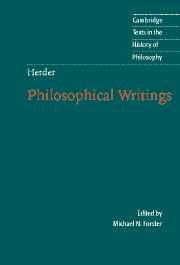Book contents
- Frontmatter
- Contents
- Introduction
- Chronology
- Further reading
- Note on the texts and translation
- Part I General Philosophical Program
- Part II Philosophy of Language
- Part III Philosophy of Mind
- Part IV Philosophy of History
- On the Change of Taste (1766)
- Older Critical Forestlet (1767/8) [excerpt on history]
- This Too a Philosophy of History for the Formation of Humanity [an early introduction]
- This Too a Philosophy of History for the Formation of Humanity (1774)
- Part V Political Philosophy
- Index
- Cambridge texts in the history of philosophy
This Too a Philosophy of History for the Formation of Humanity (1774)
Published online by Cambridge University Press: 05 June 2012
- Frontmatter
- Contents
- Introduction
- Chronology
- Further reading
- Note on the texts and translation
- Part I General Philosophical Program
- Part II Philosophy of Language
- Part III Philosophy of Mind
- Part IV Philosophy of History
- On the Change of Taste (1766)
- Older Critical Forestlet (1767/8) [excerpt on history]
- This Too a Philosophy of History for the Formation of Humanity [an early introduction]
- This Too a Philosophy of History for the Formation of Humanity (1774)
- Part V Political Philosophy
- Index
- Cambridge texts in the history of philosophy
Summary
A contribution to many contributions of the century
Tarassei tous anthrôpous ou ta pragmata alla ta peri tôn pragmatôn dogmata.
Philosophy of history for the formation of humanity
First section
The further illumination advances in the investigation of the most ancient world history, its migrations of peoples, its languages, ethics, inventions, and traditions, the more probable becomes, with each new discovery, the origination of the whole species from a single man as well. We are getting closer and closer to the happy clime where a single pair of human beings, under the gentlest influences of creating Providence, with the help of the most facilitating dispensations all around them, began spinning the thread that has since drawn itself out further far and wide with such entanglements; where hence also all initial contingencies can be regarded as the arrangements of a maternal Providence for developing a delicate double seed of the whole species with all the selectiveness and care that we must always credit to the Creator of such a noble species and to His outlook ahead over millennium and eternity.
[It is] natural that these first developments were as simple, delicate, and miraculous as we see them in all of nature's products. The seed falls into the earth and dies; the embryo gets formed [gebildet] hidden away, as the philosopher's spectacles would hardly approve a priori, and comes forth fully formed; hence the history of the human species' earliest developments, as the oldest book describes it, may sound so short and apocryphal that we are embarrassed to appear with it before the philosophical spirit of our century which hates nothing more than what is miraculous and hidden – [but] exactly for that reason it is true.
- Type
- Chapter
- Information
- Herder: Philosophical Writings , pp. 272 - 358Publisher: Cambridge University PressPrint publication year: 2002
- 5
- Cited by



